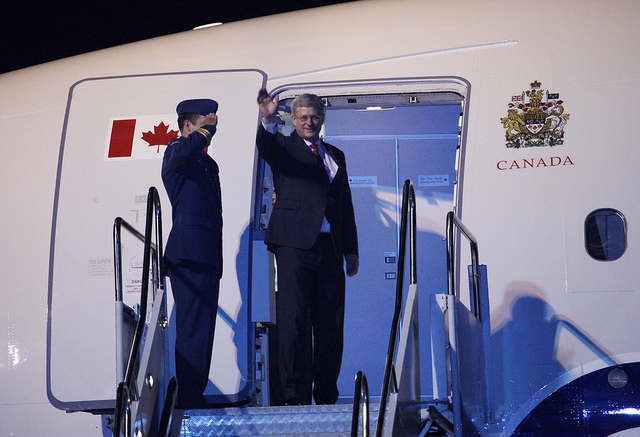Like this article? rabble is reader-supported journalism. Chip in to keep stories like these coming.
The Liberals and the Conservatives are holding overlapping conventions, which, for some, might entail a surfeit of political rhetoric.
The Conservatives started first.
In Vancouver, on Thursday night, they heard, for the first time since election night, from their outgoing leader, Stephen Harper.
Those who remember former Prime Minister Brian Mulroney’s remarks in 1993, when he announced he would be stepping down, will notice an eerie similarity with Harper’s comments on Thursday night.
Both departing leaders were much more interested in the health and well-being of their parties, as a political machines, than in their accomplishments in government.
Mulroney boasted to his supporters that he had achieved the first (and only) back-to-back Conservative majorities in the 20th century.
It was a record with an asterisk. Conservative Robert Borden won two majorities in a row, in 1911 and 1917, but the second was not, strictly speaking, a Conservative government. It was Unionist, an alliance of Conservatives and Liberals who had (temporarily) abandoned their party to support Borden’s war effort, in particular his plan for conscription.
Mulroney thought the asterisk was enough to give him bragging rights.
He told Conservatives that he was bequeathing them a party in good shape, financially and politically.
His successor, Kim Campbell, won two seats in the next election.
Harper’s point on Thursday was that the 99 seats Conservatives won in the 2015 election, and their continued success at fundraising, put them in a good stead for the next round.
The Conservatives are clearly the one opposition party positioned to replace the government, Harper asserted, as though it is self-evident. And it’s a reasonable enough claim, at first blush.
But lest we forget, the NDP had a similar view when it won about the same number of seats, with the same percentage of the vote, in 2011. To the NDP’s enormous chagrin, it turned out that when voters wanted change they were just as happy to turn to the third party as to the official opposition.
Harper might be proud of his record in office as prime minister. But we will have to wait for his memoirs to get more detail than the thin gruel he offered in his farewell speech.
This Conservative convention seems to be, mostly, about the future of the party, not the prospects for Canada.
Maybe that will change, at least a bit, when bad boy businessman and reality television star Kevin O’Leary speaks. He holds no particular brief for the Conservative Party, and has lots of bracing ideas for indolent, spoiled and unproductive Canadians.
Francophones, however, will need translation to understand the multi-millionaire’s brilliant and insightful policy proposals. He has never bothered to learn their language.
Here come sunny ways, again
For the Liberals, when they meet in Winnipeg it will be a chance to celebrate big time.
Everything is going splendidly for Trudeau’s team.
They are up — way up — in the opinion polls, are forging full steam ahead with their legislative agenda, and are getting rave reviews internationally. And if elbowgate got huge play in the world’s media, well, HBO’s John Oliver probably summed it up best, from the non-Canadian perspective, when he said the incident was “a brawl by Canadian standards, although, to be honest, in New York we just call that shopping at Trader Joe’s.”
The Ottawa press corps was pretty tough on Prime Minister Trudeau for his never-before-seen episode of swearing and elbowing. They were already concerned about the alacrity with which the Liberals were using the Harper-like tactic of muzzling parliamentary debate.
Nonetheless, and as many others have pointed out, little of the press gallery’s concern seems to resonate in the country. And opposition MPs didn’t help their cause with over-the-top talk of gender-based abuse and loose analogies to drunk drivers.
But the Liberals and their leader know that today’s adulation can turn into tomorrow’s scorn. And they know it can be hard to effectively govern, and manage public expectations, when you face a skeptical and grouchy press gallery and opposition benches in permanent high dudgeon.
We can expect that the tone the Liberals and their leader take this weekend, and next week when the House returns, will not be Harper-style divisiveness and über-partisanship.
This writer predicts we’ll see a conscious effort to return to sunny ways.
The Trudeau government will not forget that democratic reform, including renewed respect for Parliament and all parliamentarians, was high on its long list of election promises.
Having said that, it would be fitting if, in a spirit of reconciliation, the Liberals expanded the special committee on electoral reform by one member, to give the New Democrats two rather than one. As it stands, the Liberals have six members and the Conservatives three, giving them each about one member for every 30 of their MPs.
The New Democrats get one member for their 44 MPs. Adding one more MP to the committee would mean the Liberals maintained a majority (six out of 11), but it would show they are sensitive to the argument that they are taking unfair advantage of their majority.
Would that be asking too much in a world where partisanship still counts for a whole lot?
Photo: flickr/APEC 2013



